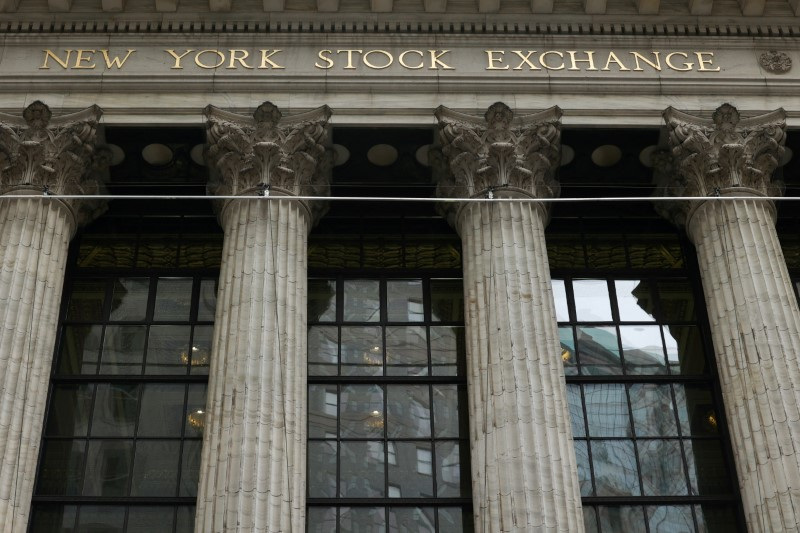By Jamie McGeever
ORLANDO, Florida (Reuters) - If you're sure we're in a mass-market equity bubble, you probably have to rely on instinct as to what happens next as there are precious few historical examples to guide you as to when, where or even if it will implode.
One reason people continually compare the tech-led U.S. stock market boom of the moment to the disastrous dotcom implosion in 2000 is that the latter is really the only true U.S. equity market bubble and bust of the post-World War Two period.
And while there's good reason to fear a repeat of that millennium psychosis - the bear market that ensued lasted almost three years and markets didn't durably recover the peaks for over a decade - the timing of the bust was almost random. The market eventually just fell over itself.
It's one of the few stock market busts in decades not triggered by an external shock or specific event - or circumstances beyond what might be deemed the plain old 'irrational exuberance' of stock investors themselves.
Black Monday in 1987? High valuations, yes, but also worries over growth, inflation and the trade deficit. 2008? A U.S. housing bust, banking crash and credit crunch. 2020? A global pandemic. 2022? An energy and supply chain shock from Russia's invasion of Ukraine that spiked inflation and interest rates.
But more than most, the bursting of the dotcom bubble in 2000 was the result of ever crazier valuations that eventually succumbed to the laws of gravity - in large part because there was scant revenue or profit growth emerging to back them up.
Tech today is nowhere near as expensive, and is riding a very real boom in underlying revenues. Yet pockets could get extremely frothy very soon.
And if there is a bust looming, like 2000, it is not immediately clear what will trigger it. Recession seems a ways off, businesses are not over-extended and are cash-rich, the Fed's next move on rates will almost certainly be a cut, and earnings growth forecasts are in double digits for next year.
FAIR VALUE
The crash of 2000 was the most prolonged and one of the deepest of recent decades - the Nasdaq bubble took three years to deflate, the peak-to-trough fall was a staggering 80%, and it was 16 years before the index revisited its previous high.
Black Monday in October 1987 may have been the biggest one-day collapse ever, but the Dow and S&P 500 ended that year higher. The recoveries from the Great Financial Crisis and pandemic crashes, aided by vast monetary and fiscal support, were far quicker too.
On some level, it may be that purely speculative market runs that eventually get crushed under their own weight leave deeper scars.
"Only the dotcom implosion was an equity bubble," says Barry Ritholtz, CIO of Ritholtz Wealth Management, noting that a bubble is typically an asset class that becomes un-moored from intrinsic value, that leads to excessive speculation, that leads to a giant market crash.
He echoes the broad consensus that while the 'Magnificent 7' clutch of mega tech stocks powering the market higher are expensive, they are not in that space yet. Expectations of $2 trillion in revenue and $300 billion profits this year see to that.
"Are they above fair value? Probably, but all great stocks are. Fair value is not a magnet that automatically draws markets there. In fact, stocks rarely find themselves at fair value," he says.
HOPE AND MOMENTUM
Accurately assessing 'fair value' is difficult, but most people would agree tech and the wider market were well above it in early 2000 - tech stocks were trading up to 70 times forward earnings.
Contrast that with valuations just before the busts in 2008 and 2020. They were much lower, particularly in 2008, which may help explain why the drawdowns were shallower and relatively short-lived.
In real terms the dotcom drawdown lasted over a decade, second only behind the Great Depression, according to UBS.
Stocks today are expensive, but they were pricier in 2021. Since then, the Nasdaq and S&P 500 have entered bear markets, rebounded 50-60%, and reached new record highs.
This suggests today's optimism about the productivity-enhancing effects of technology may be more justified than 25 years ago.
That may change if some of the eye-popping revenue and profits forecasts fail to materialize. But consumer and corporate balances sheets are in good shape - the S&P 500's market cap has soared by almost $11 trillion in the last five months.
Brett House, professor at Columbia Business School, doesn't believe the current tech boom is history repeating itself. If he's right the drawdown, when it comes, is unlikely to be as prolonged or painful either.

"If there are reasons to justify valuations beyond pure hope or momentum, it may be that the scale of any subsequent correction is smaller and the length of the correction is shorter," he said.
(The opinions expressed here are those of the author, a columnist for Reuters.)
(By Jamie McGeever; Editing by Chizu Nomiyama)